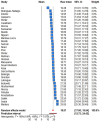Systematic Review and Meta-Analysis of Fear of COVID-19
- PMID: 34177712
- PMCID: PMC8231929
- DOI: 10.3389/fpsyg.2021.661078
Systematic Review and Meta-Analysis of Fear of COVID-19
Abstract
Background: Due to lack of preparedness of health systems, fast spread of the new virus, high mortality rates, and lack of a definite treatment, the outbreak of Coronavirus disease (COVID-19) led to high levels of fear and anxiety in different populations. In addition, isolation, mental disorders, and limitations in social interactions as a result of lockdown and travel ban increased the fear of the new coronavirus. Methods: International databases, including Scopus, PubMed, Web of Science, and Google scholar, were searched without any time limitation, and all observational studies published in English reporting the mean of fear of COVID-19 based on the Fear of COVID-19 scale (FCV-19S) were included in the analysis. Methodological quality was assessed using the Strengthening the Reporting of Observational Studies in Epidemiology (STROBE) guidelines. Random effects model, subgroup analysis, and meta-regression analysis were used to analyze the data. Heterogeneity across studies was examined using Cochran's Q test and I 2 statistic. All the statistical analyses were conducted using R software v4.0.3. Results: A total of 44 articles with a sample size of 52,462 were reviewed. A pooled mean of 18.57 was found for fear of COVID-19. The mean of fear of COVID-19 was higher in women than in men (20.67 vs. 18.21). The highest and lowest means of fear of COVID-19 had been found in Asia (18.36) and Australia (17.43) based on continent, and in hospital staff (19.51) and college students (17.95) based on target population, respectively. In addition, the highest and lowest means of fear of COVID-19 were related to items #1 and #3 of the scale, respectively. According to the results of meta-regression analysis, there was no significant association between the mean of fear of COVID-19 and sample size and participants' age. In addition, publication error was not significant (P = 0.721). Conclusion: The mean of fear of COVID-19 was high around the world; therefore, it seems necessary to pay more attention to the negative effects of the COVID-19 pandemic on mental health.
Keywords: COVID-19; fear; fear of COVID-19; meta-analysis; systematic review.
Copyright © 2021 Luo, Ghanei Gheshlagh, Dalvand, Saedmoucheshi and Li.
Conflict of interest statement
The authors declare that the research was conducted in the absence of any commercial or financial relationships that could be construed as a potential conflict of interest.
Figures
Similar articles
-
Fear of COVID-19 Among College Students: A Systematic Review and Meta-Analysis.Front Public Health. 2022 Mar 1;10:846894. doi: 10.3389/fpubh.2022.846894. eCollection 2022. Front Public Health. 2022. PMID: 35299699 Free PMC article.
-
Prevalence of self-medication during COVID-19 pandemic: A systematic review and meta-analysis.Front Public Health. 2022 Nov 3;10:1041695. doi: 10.3389/fpubh.2022.1041695. eCollection 2022. Front Public Health. 2022. PMID: 36408026 Free PMC article.
-
Item Response Theory Analysis of the Fear of COVID-19 Scale (FCV-19S): A Systematic Review.Psychol Res Behav Manag. 2022 Mar 8;15:581-596. doi: 10.2147/PRBM.S350660. eCollection 2022. Psychol Res Behav Manag. 2022. PMID: 35300204 Free PMC article. Review.
-
Prevalence of Cigarette Smoking and its Related Factors among Students in Iran: A Meta-Analysis.Tanaffos. 2022 Mar;21(3):271-282. Tanaffos. 2022. PMID: 37025309 Free PMC article. Review.
-
Gender and COVID-19 related fear and anxiety: A meta-analysis.J Affect Disord. 2022 Aug 1;310:384-395. doi: 10.1016/j.jad.2022.05.036. Epub 2022 May 11. J Affect Disord. 2022. PMID: 35561885 Free PMC article. Review.
Cited by
-
Psychometric evaluation of the Chinese version of new fear of the coronavirus questionnaire.Medicine (Baltimore). 2024 Mar 1;103(9):e37282. doi: 10.1097/MD.0000000000037282. Medicine (Baltimore). 2024. PMID: 38428903 Free PMC article.
-
Associations between fear of COVID-19, dental anxiety, and psychological distress among Iranian adolescents.BDJ Open. 2022 Jun 27;8(1):19. doi: 10.1038/s41405-022-00112-w. BDJ Open. 2022. PMID: 35760784 Free PMC article.
-
Effects of the COVID-19 pandemic on the health of medical students transitioning from traditional education to distance learning: a prospective cohort.BMC Med Educ. 2025 Feb 21;25(1):284. doi: 10.1186/s12909-024-06407-w. BMC Med Educ. 2025. PMID: 39979861 Free PMC article.
-
The Human Aspect of Horse Care: How the COVID-19 Pandemic Impacted the Wellbeing of Equestrian Industry Stakeholders.Animals (Basel). 2021 Jul 22;11(8):2163. doi: 10.3390/ani11082163. Animals (Basel). 2021. PMID: 34438622 Free PMC article.
-
The COVID-19 fear, anxiety, and resilience among emergency nurses.Front Psychol. 2022 Sep 2;13:999111. doi: 10.3389/fpsyg.2022.999111. eCollection 2022. Front Psychol. 2022. Retraction in: Front Psychol. 2023 Sep 04;14:1285158. doi: 10.3389/fpsyg.2023.1285158. PMID: 36118421 Free PMC article. Retracted.
References
-
- Abad A., da Silva J. A., de Paiva Teixeira L. E., Antonelli-Ponti M., Bastos S., Mármora C. H., et al. . (2020). Evaluation of fear and peritraumatic distress during COVID-19 pandemic in brazil. Adv. Infect. Dis. 10:184. 10.4236/aid.2020.103019 - DOI
-
- Ahorsu D. K., Imani V., Lin C. Y., Timpka T., Broström A., Updegraff J. A., et al. . (2020c). Associations between fear of COVID-19, mental health, and preventive behaviours across pregnant women and husbands: an actor-Partner interdependence modelling. Int. J. Ment. Health Addict. 1–15. 10.1007/s11469-020-00340-x - DOI - PMC - PubMed
Publication types
LinkOut - more resources
Full Text Sources




